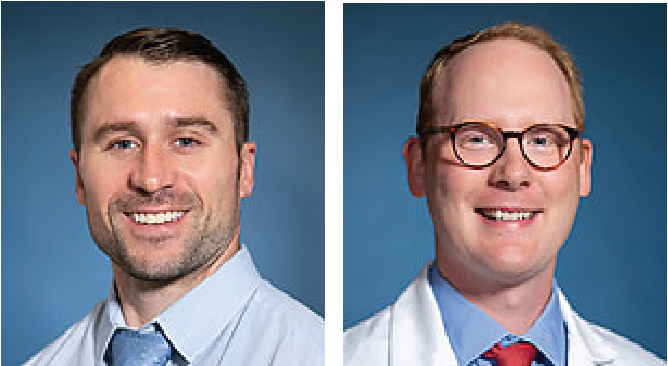 By Merin C. MacDonald
By Merin C. MacDonald
In 2022, the Division of Hospital Medicine launched its Procedural Service as a way to help address patient flow challenges. The idea emerged from pre-pandemic conversations between Greg Leslie, MD, physician, assistant professor of medicine, clinical and interim division chief, and Michael Devine, DO, physician and assistant professor of medicine, both of Hospital Medicine, and subsequent discussions with fellow hospitalists. At the time, they had observed that while resident teams in the division had trainees who could perform bedside procedures such as lumbar punctures, paracenteses, and arterial punctures for blood draws because it was part of their training, nonresident teams were left to call on others for assistance. Over the previous years, they had seen an increase in patient volume, and to address this, the number of nonresident teams had also grown. This was leaving more teams reliant on either a chief resident or fellow to perform these procedures and if they were not available, they would have to call on interventional radiology, which would often take 24-48 hours. Hospitalists had started to feel the impact of this and patients had too.
Drs. Leslie and Devine thought that if they could create a service where hospitalists were trained and credentialed to perform these procedures it would help with some of the flow challenges. While reviewing current literature, they discovered that one of their former UMass Chan Internal Medicine Residency classmates, Dr. Chase Webber, had recently presented on a procedural service that was in its fifth year at Vanderbilt. The data from Vanderbilt looked promising and provided Drs. Leslie and Devine a roadmap on how to build out a procedural service in Hospital Medicine at UMass Memorial.
Although their plans were briefly stalled by surges during the pandemic, they pushed forward and in 2021, put a call out to fellow hospitalists to identify a core group who were interested in getting credentialed in paracenteses and lumbar punctures (the most commonly required bedside procedures in Medicine services). They were pleasantly met with enthusiasm by their colleagues. “It's been really fun to build this up,” said Dr. Devine, who currently serves as the director of the Procedural Service. “We had a whole spectrum of attendings at various levels in our division that have wanted to be part of this, from senior, decorated faculty to junior faculty that were interested in [learning and getting credentialed] in these procedures.”
Much of the first year was spent getting a group of seven hospitalists to perform enough procedures to be credentialed and communication with their colleagues would prove to be essential to their success. They established an EPIC chat group, “Hospital Medicine Procedural Service” as a way to familiarize the division with the new service and provide them the opportunity to request a procedure from the new team. This enabled the group to perform the required number of procedures to be credentialed, and as they became credentialed, they began to have a noticeable impact on patient flow. “The biggest benefit of this Procedural team is that it allows for diagnostic or therapeutic procedures to happen as quickly as possible in order to let the teams advance the care plan,” said Dr. Leslie.
The group has continued to find new ways to alert their colleagues of the service and has improved their own workflow as well. In addition to the EPIC chat group, they use the scheduling app QGenda in which they have color-coded every hospitalist who is credentialed, which helps them quickly identify who is covering and can perform these procedures so that they can easily assign an attending to a procedure when it is needed. “Since 2021 we've quadrupled the number of procedures that have been done by Hospital Medicine, which is a sign that knowledge about [the Procedural Service] is growing and teams are reaching out to us more frequently,” said Dr. Leslie.
Word of the success of the Procedural Service is also spreading beyond Hospital Medicine. In a case where a patient was in the ER and due for a liver transplant, there was a liver available but before going to the OR the patient needed a paracentesis to make sure there were no signs of infection, so they called Dr. Devine. He immediately went to the ER where he was able to complete the procedure and the patient went into surgery later that night. “What started as something that we meant to have as a resource for the hospitalists is growing because it can also help outside of our division, so we're pretty excited,” said Dr. Leslie.
